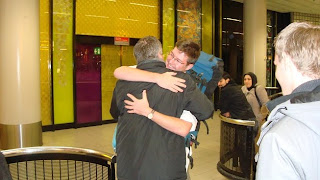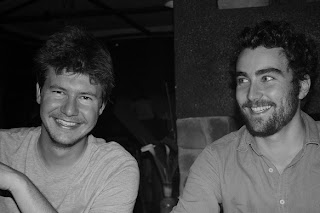In the previous post (or actually the previous 4 posts) something was missing. Something big. From October 28 to October 8 I was in Kindu; the capital of Maniema and a city build next to... the Congo River. Over the last years I have read so many books about this River. Books such as Conrad's Heart of Darkness, Crichton's Congo, Hochchild's King Leopold's Ghost, Butcher's (horribly bad) Blood River, Naipaul's A Bend in the River, Roberts' A Journal of a Tour in the Congo Free State, etc. had created an image in my mind of the Congo River - or "La Fleuve" ("The Source" as they call it in Kindu) as this big, mystical river. A river that in reality could never surpass the expectations I had of it. How wrong was I:
 I flew with a MONUSCO plane from Bukavu to Kindu: only about a two
I flew with a MONUSCO plane from Bukavu to Kindu: only about a two
hour flight. After about an hour the rainforest started. I thought I knew what
to expect. When I finally saw a big river running like a snake through
the forest, I felt... nothing. Dissappointing! Was this what I read about.
Was this the magical Congo River?! But we kept on flying. After thirty more
minutes a new river could be seen snaking through the rainforest far
away. As we neared the River I got a chill on my back: This was the Congo River!
So beautiful and so big. On the picture: A first glimpse of "La Fleuve".

There is a reason why the people call the River "La Fleuve". First, Kindu
is completely isolated; a city hidden in the rainforest. Everything is either
flown in from Bukavu, or (mainly) brought from Kinsangani via the River: a
5-day trip in a piroque to get from Kindu to Kisangani (back to Kindu
takes longer as it is against the River's current). Second, people wash their
food, themselves, their clothes, etc. in the River. People use it as a big toilet
and use it as drinking water. On the picture: Close to Kindu there are not
too many crocodilles and hippos so children play in the River.

On the picture: As soon as the River stops. The rainforest starts.
 The mode of transportation on the River is the
The mode of transportation on the River is the
piroque. These are boats cut out from a tree (yes in
one piece) and can be as long as fifteen meter. They are
really impressive. On this picture: We often had to cross the
River with our motorbikes to reach a new village. Thus:
motorbikes in the piroque. The Congo River is the deepest river in the world with depths in
The Congo River is the deepest river in the world with depths in
excess of 230 meter and the second largest river in the world by
volume of water discharged (yes, Wikipedia). It is a river you donot want to see angry. On the picture: This was shortly before a storm.
For one hour: strong winds, heavy rain and waves that made me think
I was in the Netherlands looking at the North Sea. One hour later
the sun was shining again as if nothing happened. So impressive!

















































